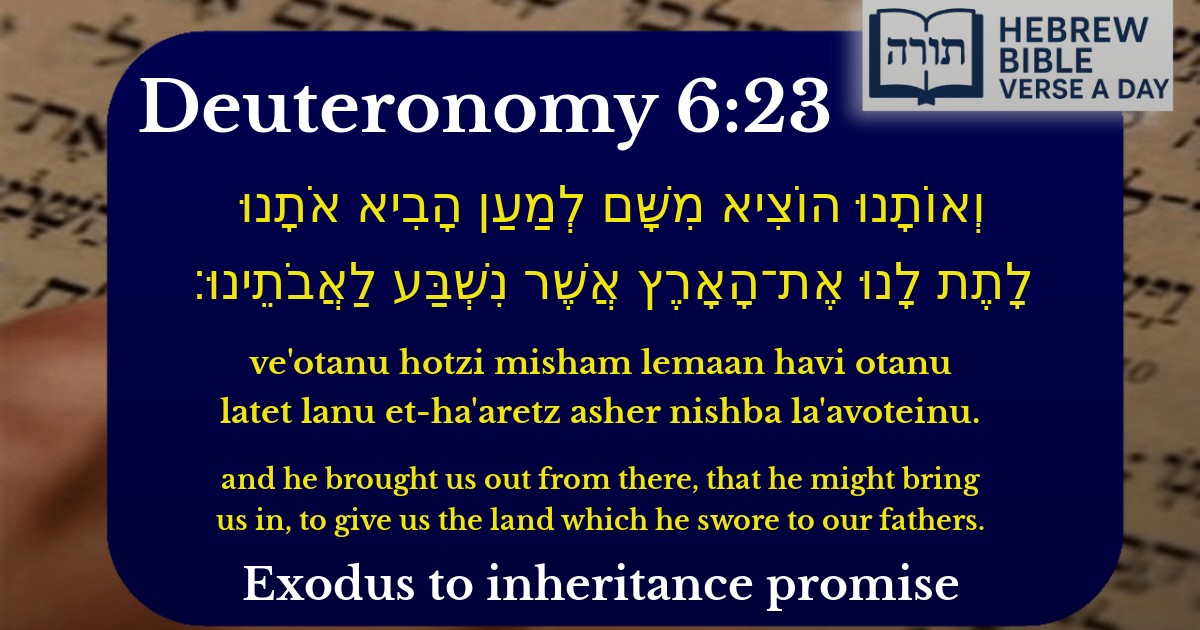Frequently Asked Questions
Q: What does Deuteronomy 6:23 mean?
A: Deuteronomy 6:23 explains that Hashem took the Jewish people out of Egypt (the Exodus) with the purpose of bringing them into the Land of Israel, which He promised to our forefathers (Abraham, Isaac, and Jacob). This verse highlights the divine plan connecting the Exodus with the inheritance of the Land of Israel.
Q: Why is the Exodus mentioned together with entering the Land of Israel in this verse?
A: Rashi explains that the Exodus from Egypt was not an end in itself but a means to fulfill Hashem's promise to give the Land of Israel to the Jewish people. The two events are intrinsically linked—the redemption from slavery was the first step toward establishing the Jewish nation in their homeland.
Q: What can we learn from Deuteronomy 6:23 today?
A: This verse teaches us that Hashem's miracles (like the Exodus) have a greater purpose. Just as He freed us from Egypt to bring us to Israel, we must recognize that our personal and national experiences are part of a divine plan leading to a higher goal—fulfilling our covenant with Hashem.
Q: How does this verse connect to the covenant with our forefathers?
A: The Ramban (Nachmanides) explains that this verse emphasizes that the Land of Israel was given to the Jewish people as an eternal inheritance based on the oath Hashem made to Avraham, Yitzchak, and Yaakov (Genesis 15:18, 26:3, 28:13). The Exodus was the first step in fulfilling that promise.
Q: Why does the Torah repeat that Hashem 'swore to our fathers'?
A: The Talmud (Berachot 32b) teaches that mentioning the oath to our forefathers reinforces that the Jewish claim to the Land of Israel is unbreakable—it is based on Hashem's eternal promise, not just historical events. This reminds us of our spiritual connection to the land throughout all generations.


Explanation of the Verse
The verse (Devarim 6:23) emphasizes Hashem's dual purpose in redeeming the Jewish people from Egypt: not only to free them from slavery but also to bring them into Eretz Yisrael, fulfilling the oath made to the Avot (Avraham, Yitzchak, and Yaakov). This reflects the broader divine plan of establishing the Jewish nation in their ancestral land.
Rashi's Commentary
Rashi explains that the phrase "וְאוֹתָנוּ הוֹצִיא מִשָּׁם" ("and He brought us out from there") refers to the Exodus from Egypt, while "לְמַעַן הָבִיא אֹתָנוּ" ("that He might bring us in") alludes to entering Eretz Yisrael. Rashi highlights that the Exodus was not an end in itself but a means to fulfill the covenant with the Avot by settling the Jewish people in their promised land.
Rambam's Perspective
In Hilchot Melachim, Rambam (Maimonides) teaches that inheriting Eretz Yisrael is a foundational mitzvah for the Jewish people. This verse underscores that the Exodus was intrinsically linked to the divine promise of the land, reinforcing the eternal bond between Am Yisrael and Eretz Yisrael.
Midrashic Insights
Theological Implications
The verse teaches that geulah (redemption) is not complete without settling in Eretz Yisrael. This idea is echoed in the daily prayers, where we thank Hashem both for taking us out of Egypt and bringing us to our land. The dual aspects of יציאת מצרים (Exodus) and כניסת הארץ (entry into the land) are inseparable in Jewish thought.